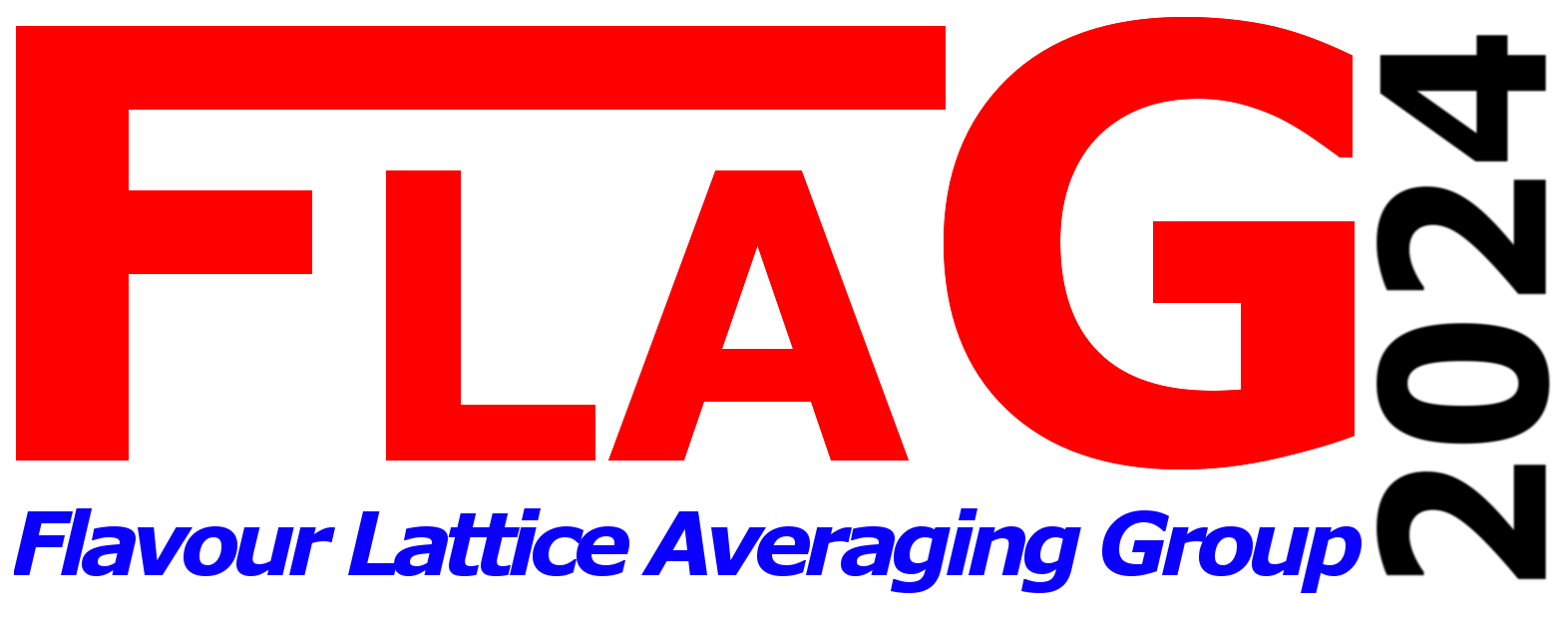FLAG Review 2024
|
Please note that is is mandatory to cite the original sources when citing a result from FLAG. We facilitate this by providing corresponding bibtex files for each FLAG average and the corresponding plot, see also our paragraph on citation policy.
The version of the FLAG review as of November 2024 is accessible here.
The separate sections can be downloaded as separate pdf-files following the links in the table of contents below, or via the menu in the sidebar. Clicking on the FLAG logo in the upper left corner links back to this main page.
The latest figures can be downloaded in pdf and png format, together with a bib-file containing the bibtex-entries for the calculations which contribute to the FLAG averages and estimates. The downloads are available via the menu in the sidebar.
In the notes we compile detailed information on the simulations used to calculate the quantities discussed in the review. In the current report we present this information only for results that are new w.r.t. FLAG 21. For all other results the information is available in the corresponding Appendices of the previous reports.
The previous version of the FLAG review was updated as of February 2024 and is accessible at flag.itp.unibe.ch/2021 where also the original 2021 edition of the FLAG review can be downloaded. The original complete 2019 review is still accessible from flag.itp.unibe.ch/2019 and the 2015/2016 review from EPJC. The 2016/2017 updates are available from here. The 2013/2014 review is accessible here or from EPJC.
Contents
- Introduction
- Quality criteria
- The low-energy limit of the Standard Model
- Quark masses
- $\small{V_{ud}}$ and $\small{V_{us}}$
- Kaon mixing
- $\small{D}$-meson decay constants and form factors
- $\small{B}$-meson decay constants, mixing parameters, and form factors
- The strong coupling $\alpha_s$
- Nucleon matrix elements
- Scale setting
- Appendix
- Notes
Inquiries and suggestions can be sent to the FLAG Editorial Board.
Introduction
The introduction with the summary tables can be downloaded here.
We review lattice results related to pion, kaon, $D$-meson, $B$-meson, and nucleon physics with the aim of making them easily accessible to the nuclear and particle physics communities. More specifically, we report on the determination of the light-quark masses, the form factor $f_+(0)$ arising in the semileptonic $K \to \pi$ transition at zero momentum transfer, as well as the decay constant ratio $f_K/f_\pi$ and its consequences for the CKM matrix elements $V_{us}$ and $V_{ud}$. We review the determination of the $B_K$ parameter of neutral kaon mixing as well as the additional four $B$ parameters that arise in theories of physics beyond the Standard Model. For the heavy-quark sector, we provide results for $m_c$ and $m_b$ as well as those for the decay constants, form factors, and mixing parameters of charmed and bottom mesons and baryons. These are the heavy-quark quantities most relevant for the determination of CKM matrix elements and the global CKM unitarity-triangle fit. We review the status of lattice determinations of the strong coupling constant $\alpha_s$. We consider nucleon matrix elements, and review the determinations of the axial, scalar and tensor bilinears, both isovector and flavour diagonal. We also review determinations of scale-setting quantities. Finally, in this review we have added a new section on the general definition of the low-energy limit of the Standard Model.
We note that the LEC section is omitted in the current review as progress in that area has slowed. FLAG will keep monitoring the situation and provide updates in future editions, should new results become available.
FLAG composition, guidelines and rules
Citation policy
Quality criteria
The section on the quality criteria can be downloaded here.
The low-energy limit of the Standard Model
The section on the general definition of the low-energy limit of the Standard Model including a specific prescription for the separation of QCD and QED contributions to hadronic observables (Edinburgh concensus) can be downloaded here.
Edinburgh concensus |
||
|
QCD |
isoQCD |
$M_{\pi^+}$ |
135.0 MeV |
135.0 MeV |
$M_{K^+}$ |
491.6 MeV |
494.6 MeV |
$M_{K^0}$ |
497.6 MeV |
494.6 MeV |
$M_{D_s^+}$ |
1967$\,$ MeV |
1967$\,$ MeV |
$M_{B_s^0}$ |
5367$\,$ MeV |
5367$\,$ MeV |
$f_{\pi^+}$ |
130.5 MeV |
130.5 MeV |
|
QCD |
isoQCD |
$M_{\pi^+}/f_{\pi^+}$ |
1.034 |
1.034 |
$M_{K^+}/f_{\pi^+}$ |
3.767 |
3.790 |
$M_{K^0}/f_{\pi^+}$ |
3.813 |
3.790 |
$M_{D_s^+}/f_{\pi^+}$ |
15.07 |
15.07 |
$M_{B_s^0}/f_{\pi^+}$ |
41.13 |
41.13 |
Quark masses
The section on the quark masses can be downloaded here.
$\small{V_{ud}}$ and $\small{V_{us}}$
The section on $V_{ud}$ and $V_{us}$ can be downloaded here.
Kaon mixing
The section on the kaon mixing can be downloaded here.
$\small{D}$-meson decay constants and form factors
The section on the $D$-meson decay constants and form factors can be downloaded here.
$\small{B}$-meson decay constants, mixing parameters, and form factors
The section on the $B$-meson decay constants, mixing parameters, and form factors can be downloaded here.
The strong coupling $\alpha_s$
The section on the strong coupling $\alpha_s$ can be downloaded here.
Nucleon matrix elements
The section on nucleon matrix elements can be downloaded here.
Scale setting
The section on scale setting can be downloaded here.
Appendix
The Appendix can be downloaded here.
Notes
Notes to the various sections can be downloaded here in reduced form (containing notes to results that are new w.r.t. FLAG 21).
This page has been accessed 66843 times.
